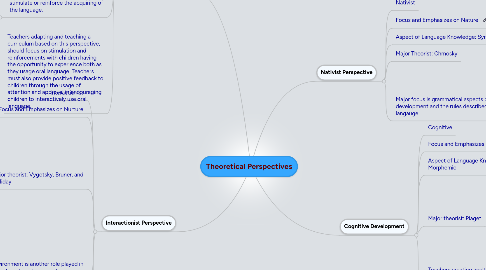
1. Behaviorist Perspective
1.1. Behaviorist
1.2. Focus and Emphasizes on Nurture
1.3. Aspect of Language Knowledge: Semantic, Syntactic, Morphemic
1.4. Major theorists: Vygotsky, Bruner, Halliday
1.5. This perspective discuss on language development in relations to the stimuli, responses, and reinforcements occurring in the child's environment. The child is considered to be a blank slate in which an adult, caregiver, teacher or others present in the child's life, stimulate or reinforce the acquiring of the language.
1.5.1. Skinner proposes his term of operant conditioning. Operant conditioning refers to the concept that reinforcement appears in the format of attention, repetitiveness, and approval. For instance the infant says ba-ba and the mother responds to the infant saying you wanted bottle and you said ba-ba. The reinforcement of this is the mother saying to the infant can you say ba-ba and the infant repeats ba-ba after his mother ask him to repeat the word and giving him a bottle.
1.5.1.1. Operant conditioning also implements on the idea of imitation in children as they attempt to repeat what an adult says referred to in the term of imitative speech. The textbook says imitative speech involves the production of speech that approximates the speech of another person and it may occur as a result of direct modeling such ask a parent asking the child to say a word or more then one word (Otto, 2010 2, 32).
1.6. Teachers adapting and teaching a curriculum based on this perspective, should focus on stimulation and reinforcements with children having the opportunity to experience both as they usage oral language. Teachers must also provide positive feedback to children through the usage of attention and approval in encouraging children to interactively use oral language.
2. Interactionist Perspective
2.1. Interactionist
2.2. Focus and Emphasizes on Nurture
2.3. Major theorist: Vygotsky, Bruner, and Halliday
2.3.1. The primary role in this perspective is sociocultural interaction in children's language development and language knowledge. Children practice oral language through communicating in the world around them.
2.3.1.1. One of the aspects to this perspective in the term of zone of proximal development. The word refers to the idea in accordance to Vygotsky that a child can accomplish the task or activity with the help by another adult, parent, teacher, caregiver or others that are present. In order for child to practice oral language the adult or someone present at the time with the childneeds to hel faciliate the learning of language as they master the oral langauge skills. This should occur until the child is able to accomplish the task or activity on their own.
2.4. Environment is another role played in the interactionist perspective
2.4.1. Environment in facilitating oral language development consists of the following conditions: immersion, demonstration, engagement, expectations, responsibility, approximations, employment, and response
2.5. Teachers implementing this perspective into their curriculum should provide array of opportunities for children to practice their oral language developing skills and the chance to particiate in a variety of social interactions with other children and adults.
3. Nativist Perspective
3.1. Nativist
3.2. Focus and Emphasizes on Nature
3.3. Aspect of Language Knowledge: Syntactic
3.4. Major Theorist: Chmosky
3.5. Major focus is grammatical aspects of language development and the rules described for using langauge
3.5.1. Chomsky proposes that this universal grammar is an innate property of the human mind and component explains the ability of all humans to learn their culture's specific language (Otto, 2010 2, 28).
3.5.2. Teachers creating curriculum on this nativist perspective should provide opportunities for students to explore language and participate in hypothesis testing in development of language knowledge
4. Cognitive Development
4.1. Cognitive
4.2. Focus and Emphasizes on Nature
4.3. Aspect of Language Knowledge: Semantic Morphemic
4.4. Major theorist: Piaget
4.4.1. The importance of this perspective implies that language is acquired due to development in part of the occurrence in maturation. Cognitive competencies also develops in this perspective. The idea is that in order for language to develop, specific cognitive growth must first occur.
4.4.1.1. Piaget proposed two stages known as sensorimotor and preoperational stage. In sensorimotor children's language in the environment comes from their direct sensory experiences and their mototr movement activities. In preoperational stage beginning at age 2 and extending to 7 years of age, children use words, images and drawings to represent the interpretation of their world.
